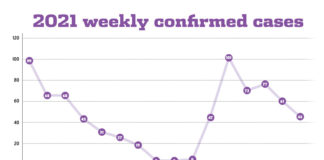
Through a combination of time and effort, things have changed since Potter’s student days. Professors, health care providers, and medical students and trainees — an increasing number of whom identify as LGBTQ — are finding ways to make medical education and training more inclusive and to improve care for LGBTQ patients at local and national levels.
HMS has now marked one of its most notable successes in this arena with the completion of the first phase of the Sexual and Gender Minority Health Equity Initiative.
Pushing the field forward
The initiative launched in 2018 with the goal of equipping all HMS students and faculty clinicians with skills to provide exceptionally high-quality, holistic health care for people who are lesbian, gay, bisexual, transgender, queer, intersex, or asexual, or have other diverse sexual orientations and genders.
Achieving that goal involved touching virtually every aspect of medical education at HMS — admissions, curriculum reform, clinical experiences, faculty development, and beyond — with the participation of members of sexual and gender minority (SGM) groups within the School and from the larger community.
The results include improvements in both the way material is taught and the culture in which teaching and learning happens, as the initiative’s leaders reported this year in Academic Medicine and Teaching and Learning in Medicine.
The impact can be seen across a range of areas, from the number of self-identified LGBTQ students enrolled at HMS, to the expansion of patient narratives used in student and faculty training, to students’ choices of scholarly projects, to participation in new SGM-focused coursework.
Those who have been involved in or inspired by the initiative are sharing what they’ve learned for the benefit of other medical educators, students, and researchers across the U.S. and around the world.
The changes have proved significant and welcome for Potter, advisory dean and director of the William Bosworth Castle academic society at HMS and co-chair of the Fenway Institute in Boston, who served as co-faculty director of the initiative.
“It’s been so meaningful to me to see how this initiative has helped push the field forward and supported students,” she said.
“It’s been thrilling to incorporate LGBTQIA+ health into the curriculum in a community-driven way,” agreed co-faculty director Alex Keuroghlian, director of the Division of Public and Community Psychiatry at Massachusetts General Hospital and of the National LGBTQIA+ Health Education Center at the Fenway Institute.
“We’ve enhanced the quality of the programs we implement across the preclinical, clinical, and clerkship spaces and how we think about the climate in which our students learn, our faculty teach, our clinicians see patients, and our community members receive care at our affiliate hospitals,” he said.
Although the initial three-year plan has concluded, initiative members are piecing together additional funding — and more often, volunteering their time — to continue progress.
“We’ve checked off a lot of the boxes we set out to, but there are always more,” said Keuroghlian. “This work is never done, and that’s OK.”








